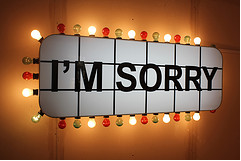 Today’s guest post is written by Anne Weiskopf.
Today’s guest post is written by Anne Weiskopf.
Apologizing is hard to do. As Elton John so memorably summed up; “Sorry seems to be the hardest word.”
But sorry can be the smartest word for your brand if it’s sincere, delivered in a timely fashion, and if concrete steps are outlined to right the wrong.
What makes one apology more successful than another is the subject of a growing body of research. A key finding is that it’s much easier to forgive a perceived mistake then an intentional act.
Let’s look at a few examples.
On July 12th Netflix sent an email to their subscribers telling them, that in September, they would be splitting DVD and streaming into two separate businesses and costs would double for their current service levels.
There was no further communication to customers until September 18th when CEO Reed Hastings issued an apology framed as an “explanation and some reflections.”
The apology not only fell flat, it actually enraged many in the Netflix community who viewed it as an attempt by the company to justify their upcoming changes. Reed’s apology was too late as Netflix had already lost one million customers and suffered a 50 percent drop in their valuation since July.
Last week, Netflix quietly retreated, announcing via email there would not be any changes to their current business model.
An effective apology, especially during a crisis, is one of the hardest but most important roles a CEO plays; it can determine a company’s ability to survive the incident. In the best case scenario, excellent crisis management can actually prove to be a positive for business. There is no better case study then the 1982 Johnson & Johnson Tylenol recall.
Last Thursday Mike Lazaridis, President of RIM took to YouTube to apologize for the company’s worldwide outage. The apology was four days into this major crisis and Lazaridis appeared wooden, and as if he were reading from a script. While Lazaridis did lay out the specific steps that RIM was putting in place to fix the problem, he missed an opportunity to tell customers they would not be charged for service during the period of Blackberry’s outage.
Given that lines were already forming at Apple for the iPhone 4S release the very next day, and with Apple’s iOS5 getting rave reviews, this should have been a no brainer. With RIM’s stock down 60 percent for the year, the stakes for Lazaridis were too high to have missed the mark.
Know when you owe someone an apology and give it.
Unless you have been hiding under a rock (or a meatball), you’re probably familiar with the kerfuffle surrounding Ragu Dads. Ragu recently launched a social media campaign targeting influential dads via Twitter. Among them was C.C Chapman, well-known blogger and author. Chapman was offended by the campaign and a lot of back and forth ensued. Whether C.C. was being a brand bully is up for debate; the fact that Ragu should have extended a direct and sincere apology isn’t.
Ragu eventually commented on a blog post more favorable to their point of view, gave a non-specific apology, and then plugged their new campaign – “and if this week has confirmed anything, it’s that moms and dads (and grandmoms and grandads, too) want to have a word on dinner — and all are welcome to join in the conversation.”
Yes, apologizing is hard but a good apology is smart. It is also good for business. So how do you do it well?
Six keys to a great apology.
- Address the issue quickly.
- “Silence is not an option in social media” – C.C. Chapman
- Even if it is not directly your fault, apologize for it anyway.
- “No, you no longer control your brand and yes, you’re still 100% responsible for its success” – Duane Primozich
- Intent matters; people are more likely to forgive an honest mistake.
- Apologize, don’t justify.
- Identify the steps that are being (or will be) taken to fix the problem.
- Pick the right medium for you to be most effective. A well written apology trumps a badly delivered video message.
- Continuously monitor all social and non-social channels so you can continue to address the issue further if needed.
What do you think? Would you add anything to this list?
Thanks to _Noura for the image, Creative Commons.
Anne Weiskopf provides sales and business development services to agencies and companies who are in the social media and technology space. She blogs at Rip Off the Roof.
Are you joining our webinar this week?
Social Media and Media Relations Measurement
with Johna Burke of BurrellesLuce moderated by Gini Dietrich.
Thursday October 27 at 11:00 a.m. CT.
This webinar is $50 and you can register here.